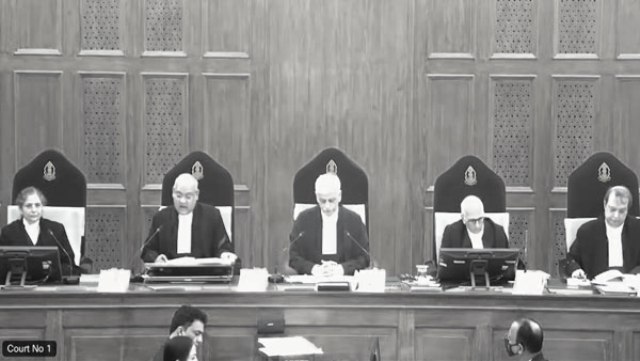New Delhi: A five-member Constitution Bench of the Supreme Court has upheld the EWS reservation by a majority of 3-2. Chief Justice UU Lalit, Justice Dinesh Maheshwari, Justice Bela M Trivedi and Justice JB Pardiwala upheld the EWS reservation while Justice S Ravindra Bhatt disagreed with the EWS reservation.
The four judges said that the EWS reservation does not violate the basic spirit of the Constitution. The four judges have upheld the 103rd amendment to the Constitution. Justice Pardiwala, a member of the bench, said that the reservation cannot be maintained indefinitely. Justice Bela Trivedi said that the policy of reservation needs to be re-examined. Justice S Ravindra Bhatt disagreed with the majority decision and said that the exclusion of SCs, STs and OBCs from the EWS quota is not right.
On September 27, the court reserved the verdict after hearing the arguments of all the parties. During the hearing, the then Attorney General KK Venugopal, on behalf of the Central Government, had said that the 50 per cent reservation limit came after Balaji’s decision, in which the court had said that the rights of the general category should not be abolished. He had said that according to the Directive Principles of State Policy, it is the responsibility of the government to maintain equality and that is why EWS was brought in.
The Attorney General had said that there is no tampering with 50 per cent reservation. Nothing has changed for SC, ST and OBC and they will remain in an advantageous position. The 10% reservation for EWS is independent of the reservation for OBC, SC and ST.
Solicitor General Tushar Mehta said that the Supreme Court has repeatedly said that Parliament should consider reservation on economic grounds. The limit of 50 per cent reservation should not be taken as a limitation of the basic structure. A constitutional amendment should be investigated only if it is found that it has violated the basic spirit of the Constitution. Mehta had said that Parliament represents the spirit of the nation. If Parliament adds any provision to the Constitution, then its validity cannot be questioned.
Senior advocate Vibha Dutt Makhija, appearing for the EWS candidates, had submitted that now the EWS candidates have become eligible. He said that it does not violate the basic structure. We have to see the change in the constitution. Society has progressed according to the times, such as Section 377 and the rights of transgenders etc. He had said that the right of EWS comes from Article 21 of the Constitution and poverty is one of the main factors. The Chief Justice then said that there is no study that families which have not got reservations have been poor from generation to generation.
What is temporary cannot be said to be permanent. Being born in an SC family is a matter of stigma that lasts for generations. Then Makhija said that the basis of the caste-based reservation is that poverty is due to social and economic backwardness. Then Justice Bhatt said that no, it is not given intentionally. Makhija then asked whether the Constitution gives reservation only on the basis of caste. We do not think that the framers of the Constitution would have thought so.
During the hearing, the petitioners had said that it violates the constitutional value of equality and reservation on economic grounds has never been discussed in the Constitution. At the same time, according to those who argued in support of EWS, this reservation was expected for a long time and it should be welcomed.

